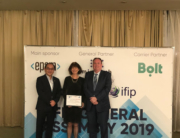T he Jean-Claude Laprie Award in Dependable Computing is awarded annually by IFIP Working Group 10.4 on Dependable Computing and Fault Tolerance in his honor. The award recognises outstanding papers that have significantly influenced the theory and/or practice of Dependable Computing. It takes the form of a memorial plaque presented to the author(s) at the Annual IEEE/IFIP International Conference on Dependable Systems and Networks (DSN).
he Jean-Claude Laprie Award in Dependable Computing is awarded annually by IFIP Working Group 10.4 on Dependable Computing and Fault Tolerance in his honor. The award recognises outstanding papers that have significantly influenced the theory and/or practice of Dependable Computing. It takes the form of a memorial plaque presented to the author(s) at the Annual IEEE/IFIP International Conference on Dependable Systems and Networks (DSN).
Eligibility and Selection Criteria
Any paper relating to dependable and secure computing and published at least 10 years prior to the award year (i.e., 2013 or earlier for the 2023 award) is eligible.
The award seeks to recognise papers that have had a significant impact in the intervening years in one or more of the three following categories:
- Technical/scientific research impact
- Industrial/commercial product impact
- Broad impact on the dependable computing community
The award may be given to more than one paper.
Nominations are due on 16th December 2022. The award will be announced in April 2023.
Nomination
Nominations may be made by any person who is familiar with the author’s or authors’ published work. The supporting material for the nomination should include (incomplete materials may jeopardise the nomination):
- Name, affiliation, and contact information of the nominator
- The nominated paper pdf
- For each author of the nominated paper: biographical information, including current position and contact details. Nominations that do not contain this information will be administratively rejected.
- Description (500 words maximum) of the impact of the paper over at least a ten-year period, addressing the following questions:
- What is the main category of impact for the nominated paper? (see “selection criteria”)
- What advances have been enabled by the ideas presented in the paper? Include as appropriate: evidence of follow-up research, evidence of usage of the described technology in an industrial setting, or evidence of starting new directions and/or spawning new ideas.
Nominations by the award committee itself are admissible at any time during the deliberation and selection process, subject to the conflict-of-interest rules established below.
Please send your nomination to the IFIP WG 10.4 Chair, Marco Vieira at mvieira@dei.uc.pt by 16th December 2022.
Award Committee
Selection will be carried out by a committee of at least five people, chaired by a person appointed by the IFIP 10.4 working group chair. The other members of the award committee will be appointed by the working group chair in consultation with the award committee chair.
The award committee is renewed annually and will be completed (no later than two weeks) after the nomination deadline, to prevent conflict of interest. The committee will complete its deliberation and selection process in time to make the award at the DSN conference, typically the last week in June.
Conflict of Interest Policy
The IFIP chair selects the chair of the award committee and collaborates with the latter in forming the rest of the committee with an eye on avoiding conflict of interest. Persons having a conflict of interest with a nominated paper may not serve on the award committee. Conflict of interest includes:
- A paper nominator.
- Being currently from the same institution as an author of a nominated paper.
- Was the PhD advisor or advisee of one of the authors of a nominated paper.
- Is a relative of an author of a nominated paper.
About Jean-Claude Laprie
Jean-Claude Laprie (1944-2010) was Directeur de Recherche at LAAS-CNRS. He devoted his entire career to research on the dependability of computing systems. His unique capability of abstraction and formalisation, and his contributions to the formulation of the concepts and methodologies of dependability were influential in defining and unifying the field of dependable and secure computing, rapidly leading to national and international recognition. He received the IFIP Silver Core in 1992, the Silver Medal of French Scientific Research in 1993 and the Grand Prize in Informatics of the French Academy of Science in 2009. He was made Chevalier de l’Ordre National du Mérite in 2002.





